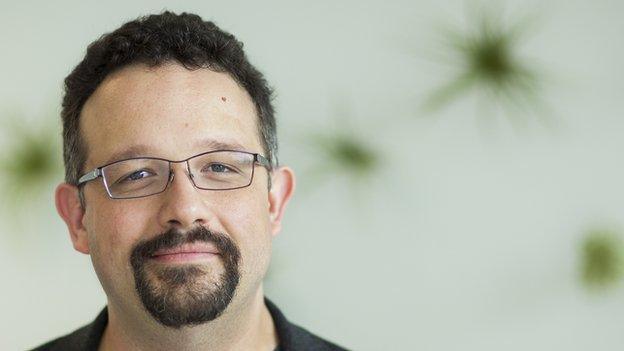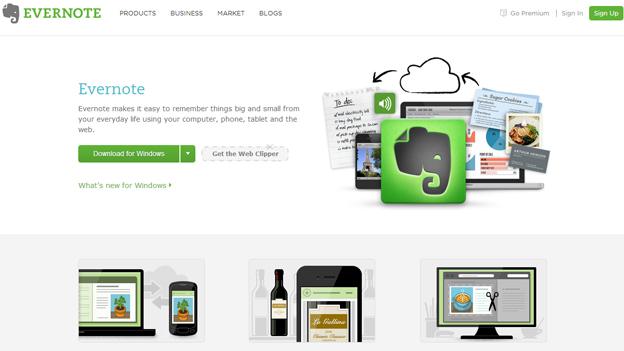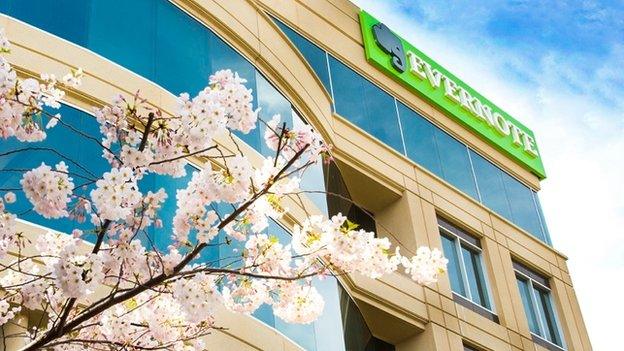Evernote's Phil Libin: The modest $1bn boss
- Published

Phil Libin, a self-confessed nerd and geek, does not have the personality of a typical chief executive.
For while most bosses of major companies have a hard-edged, go-getting confidence, the top man at US technology firm Evernote freely admits that he is "not particularly good" at many facets of his job.
One weakness Mr Libin highlights is that he says he can be "cripplingly shy", not a useful character trait for someone in his leadership role.
"If I'm at a party, I'm usually the guy standing to the side pretending to check emails on my phone," he says. "But I'm trying really hard to get better. I have handlers who point me at the right person to talk to."
The 43-year-old also says he can be disorganised.
Yet proving that successful chief executives don't all have to be cast from the same mould, Mr Libin is the boss and co-founder of a company that in just five years since it was launched is now valued at more than $1bn (£600m).
Evernote is an electronic notepad that you can access on your mobile phone and computer. It now has more than 90 million users.
And proving that Mr Libin is far from a one-trick pony, or someone who simply got a lucky break, he previously led two other technology companies, which he sold for $26m and $24m respectively.
He says: "I suppose that what I'm better than most at is pulling together other people's good ideas in a whole.
"I'm a good editor - I can pull things together and remove the 80% that is not useful. Most companies need someone like that."
Russian immigrants
Born in the Soviet Union, Mr Libin and his family were able to emigrate to the US in 1979, when he was eight.
He says his parents, both classical musicians, "got lucky" in being allowed to leave.

But going from St Petersburg (then called Leningrad) to New York certainly did not mean an immediate jump in prosperity for the family.
For while Mr Libin says his parents had "a fairly comfortable life" in the Soviet Union, after moving to the US they found themselves living "with little money" in New York's tough Bronx borough.
"We lived in a fairly dangerous neighbourhood," he says. "But I was a complete computer nerd, so I spent most of the time inside."
This obsession with computers started before Mr Libin was a teenager, and he found he had a natural aptitude. He says that by the age of 16 he was juggling school with "earning good money" doing repair work and freelance programming.
After school he studied computer science at Boston University.
However, showing a rebellious streak, he dropped out of college just before he was due to graduate.
Mr Libin says: "I literally had one class left, four credits to get. I got into some big argument with the administration - it must have been financial - I just got really angry and stormed out.
"People say, 'But yes [Bill] Gates and [Mark] Zuckerberg also dropped out of university,' but it was an incredibly bone-headed thing for me to do."
Dotcom crash
Yet by then Mr Libin did not particularly need the degree anyway, as he had a ready stream of money coming in from working as a freelance computer engineer.
And more importantly, he had ambitious plans to launch his own software company with a group of college friends.

Evernote was formed in Silicon Valley from two separate teams who pooled their talents
The business in question was Engine Five, and it built online stores for the likes of Nokia. With Mr Libin as chief executive, the company was formed in 1997 and sold three years later for $26m.
The timing was fortunate, as it was just before the bursting of the then dotcom bubble.
But Mr Libin admits this was more luck than judgement. He says: "We were just exhausted."
A year later, Mr Libin and the same group of friends started a second business, with him again in the leadership position.
Called Core Street, it made security software for banks and governments. It was sold seven years later for $24m.
Mr Libin says: "We started it after the September 11 attacks, when everyone wanted to improve their security.
"But security in general is so soul-crushingly boring. It got to the stage where me and the guys wanted to do something we loved for the first time. And that is when we came to Evernote."
Premium features
Coming up with the idea of developing a digital notepad, Mr Libin and his colleagues - still the same team from 1997 - soon realised that a separate group of programmers in Silicon Valley, California, were also at work on the same thing.
Following a series of meetings the two teams decided to merge, with Mr Libin and his colleagues moving out to the West Coast from Boston. Evernote was then born in 2008.
In addition to note writing, it allows users to add photos, sounds, webpages and other content.
It has a "freemium" business model, whereby the basic offering is free, but users can pay for premium features, such as increased storage allowance. Currently 4.5 million users pay to go premium, 5% of the total.
This is the company's only source of revenue, as it has a strict policy of not selling advertising, or sharing data.
In 2010 Evernote secured $70m of investment, which valued it at $1bn. Mr Libin has subsequently said he may consider a share flotation for the firm, which now has about 350 staff.
"Back when we started Engine Five I became the chief executive because out of the three of us I was the weakest programmer," he says.
"That was how it started, despite me never having had a management job.
"That was in 1997 and I'm still waiting for someone to challenge the fact I'm still a chief executive. But I've had the job now for 17 years, so people assume I know what I'm doing."